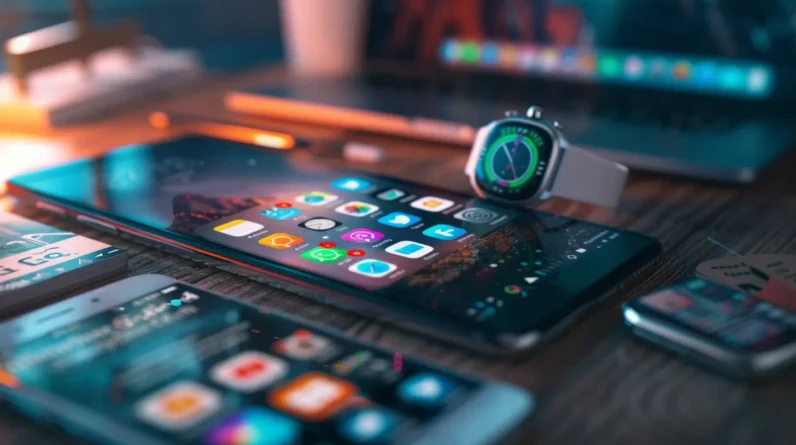
Today’s tech-centric lifestyle is almost unimaginable without the presence of smart devices. Smartphones keep us in constant communication, while smart home gadgets streamline our daily routines, making these tools indispensable to many.
However, with our growing dependency on smart devices, it is crucial to weigh their advantages against their disadvantages. This discussion will delve into the positives and negatives of smart devices, such as the improved connectivity and ease they provide, along with the potential risks to privacy and security they may bring.
We will also examine their influence on physical and mental well-being, as well as the environmental and ethical issues they entail. Let’s embark on an exploration of the multifaceted universe of smart devices.
Enhanced Connectivity and Convenience
Enhanced connectivity and convenience provided by smart devices have transformed how we engage with technology every day. These devices simplify staying in touch with friends, family, and colleagues through various communication channels. A few clicks on our smartphones enable us to quickly send messages, initiate video chats, and exchange crucial data.
This connectivity level has also reached our living spaces, with smart home appliances that we can manage from afar, promoting convenience and efficiency. For example, we can modify our home’s thermostat settings or activate our washing machines while not present.
Nonetheless, while the advanced connectivity and ease of smart devices present many benefits, it’s essential to consider potential drawbacks, such as issues of privacy and the risk of becoming overly reliant on technological solutions.
Improved Efficiency and Productivity
Exploring the enhanced connectivity and convenience offered by smart devices, it’s essential to consider how these advancements contribute to improved efficiency and productivity in our daily lives.
Smart devices have transformed the way we work and perform tasks, making them faster, easier, and more efficient. Features like voice recognition, artificial intelligence, and automation help streamline processes, automate repetitive tasks, and provide real-time information that enhances decision-making. This increased efficiency allows us to accomplish more with less time, freeing up valuable resources for other significant activities.
Smart devices also enable better organization and time management through features like calendars, reminders, and to-do lists. By helping us stay organized and on track, these devices ensure that we make the most of our time and maximize productivity.
Potential Privacy and Security Risks
Smart devices pose significant privacy and security risks that must be diligently addressed.
These devices, offering ease of use and enhanced interconnectivity, also amass and retain extensive personal data. This information could range from financial specifics to health records, and precise location tracking.
As the number of interconnected devices rises, so does the risk of security breaches and the unauthorized exploitation of this critical information. Cybercriminals may find and take advantage of weak spots in smart devices to access personal data or to take over the control of the devices. This jeopardizes individual privacy and amplifies concerns regarding potential surveillance and the improper use of personal data.
It’s therefore essential for both manufacturers and consumers to give security practices the utmost attention. Strong passwords, consistent software updates, and data encryption are some of the key strategies to reduce these risks and safeguard personal information.
Impact on Physical and Mental Health
The impact of smart devices on physical and mental health is attracting more attention and research. These devices have woven themselves into the fabric of our daily existence, providing ease and connection. Yet, their continuous use can have adverse effects on our health.
From a physical perspective, too much screen time can cause a lack of physical activity, eye discomfort, and sleep disturbances.
Mentally, being constantly connected can lead to increased anxiety, stress, and a sense of isolation. Studies suggest that extended smartphone usage might elevate the risk of depression and attention deficit disorders.
Conversely, smart devices have the potential to enhance health through activity monitoring, mindfulness apps, and easy access to health-related information. The challenge is to strike a balance and use smart devices with intention, putting our physical and mental health first.
Environmental Sustainability and Ethical Concerns
When discussing smart devices, it’s vital to examine their impact on environmental sustainability and ethical issues. Smart devices bring benefits like convenience and improved efficiency, but they also pose significant environmental and ethical dilemmas. Here are some key considerations:
– E-waste: The swift replacement cycle of smart devices contributes to the escalating problem of electronic waste, as obsolete devices are often discarded, ending up in landfills.
– Energy consumption: Smart devices require power even when idle, leading to higher electricity use and more greenhouse gas emissions.
– Supply chain ethics: Creating smart devices typically involves extracting rare earth minerals, which may cause environmental harm and exploit workers.
– Privacy and data security: These devices amass extensive personal data, prompting concerns regarding privacy violations and the possibility of misusing sensitive information.
– Planned obsolescence: There’s a belief that manufacturers of smart devices deliberately engineer products with a short lifespan, which promotes frequent replacements and feeds into a culture of disposability.
It’s essential to consider these environmental and ethical issues to promote the responsible use and advancement of smart devices.
Conclusion
Smart devices bring enhanced connectivity, convenience, and improved efficiency. However, it’s vital to keep in mind the potential privacy and security risks associated with them.
Their impact on physical and mental health is also a pressing concern. Issues related to environmental sustainability and ethical implications shouldn’t be overlooked. As we steer through the technology landscape, balancing the upsides and downsides is key to making informed decisions.
In our fast-paced digital era, we must be careful to ensure that convenience doesn’t cloud our judgment, for the cost of progress might be more substantial than we anticipate.







